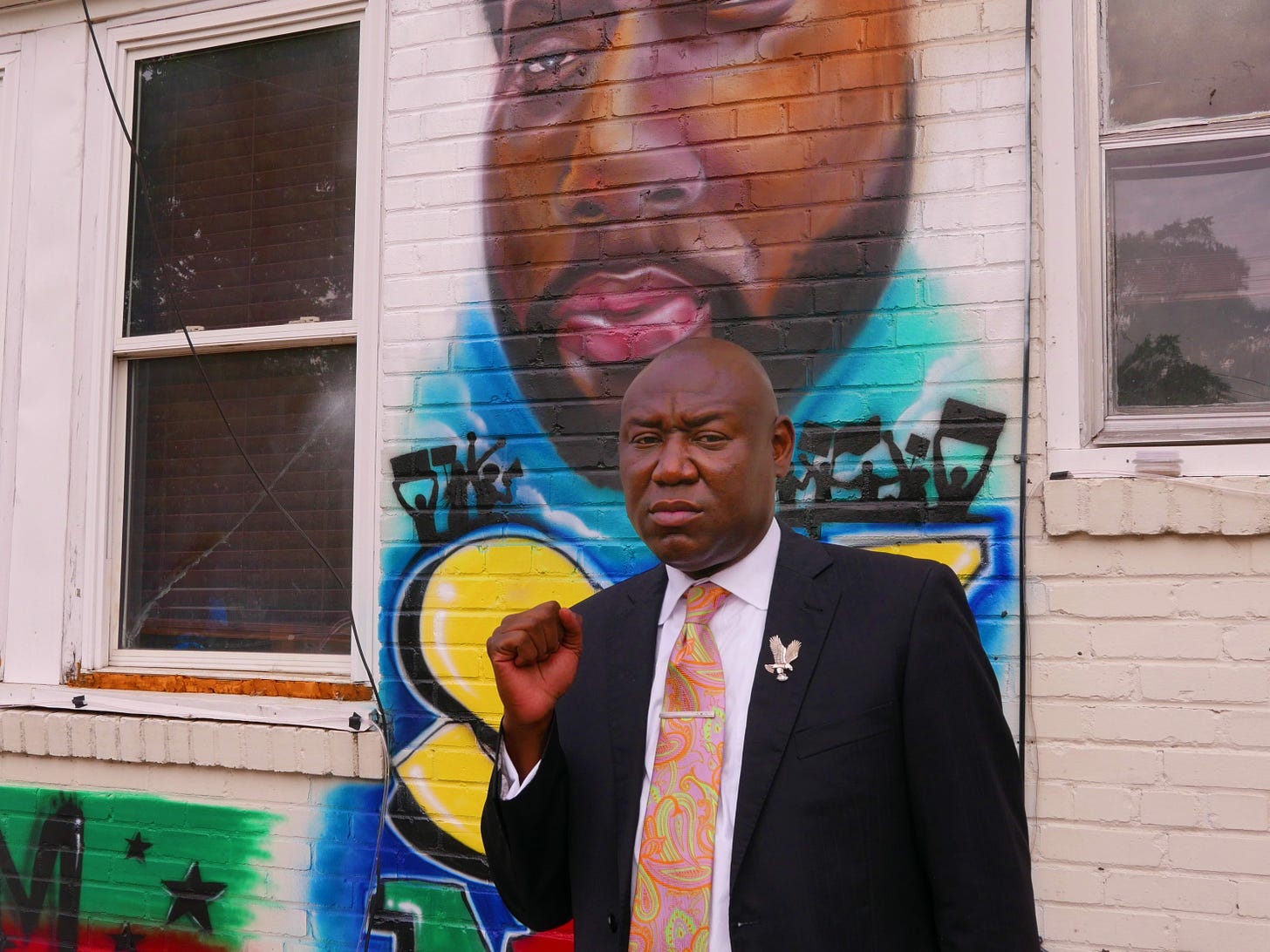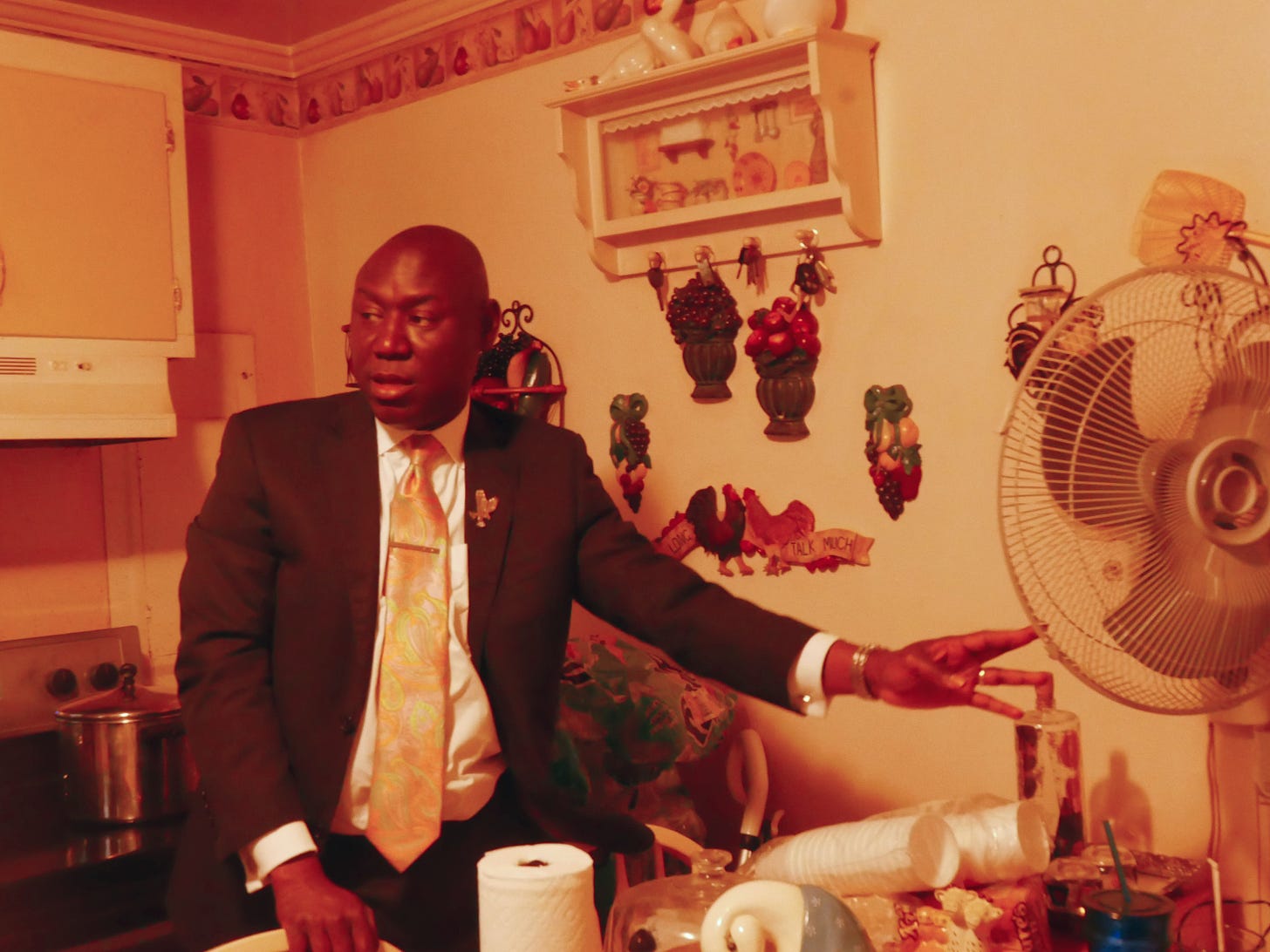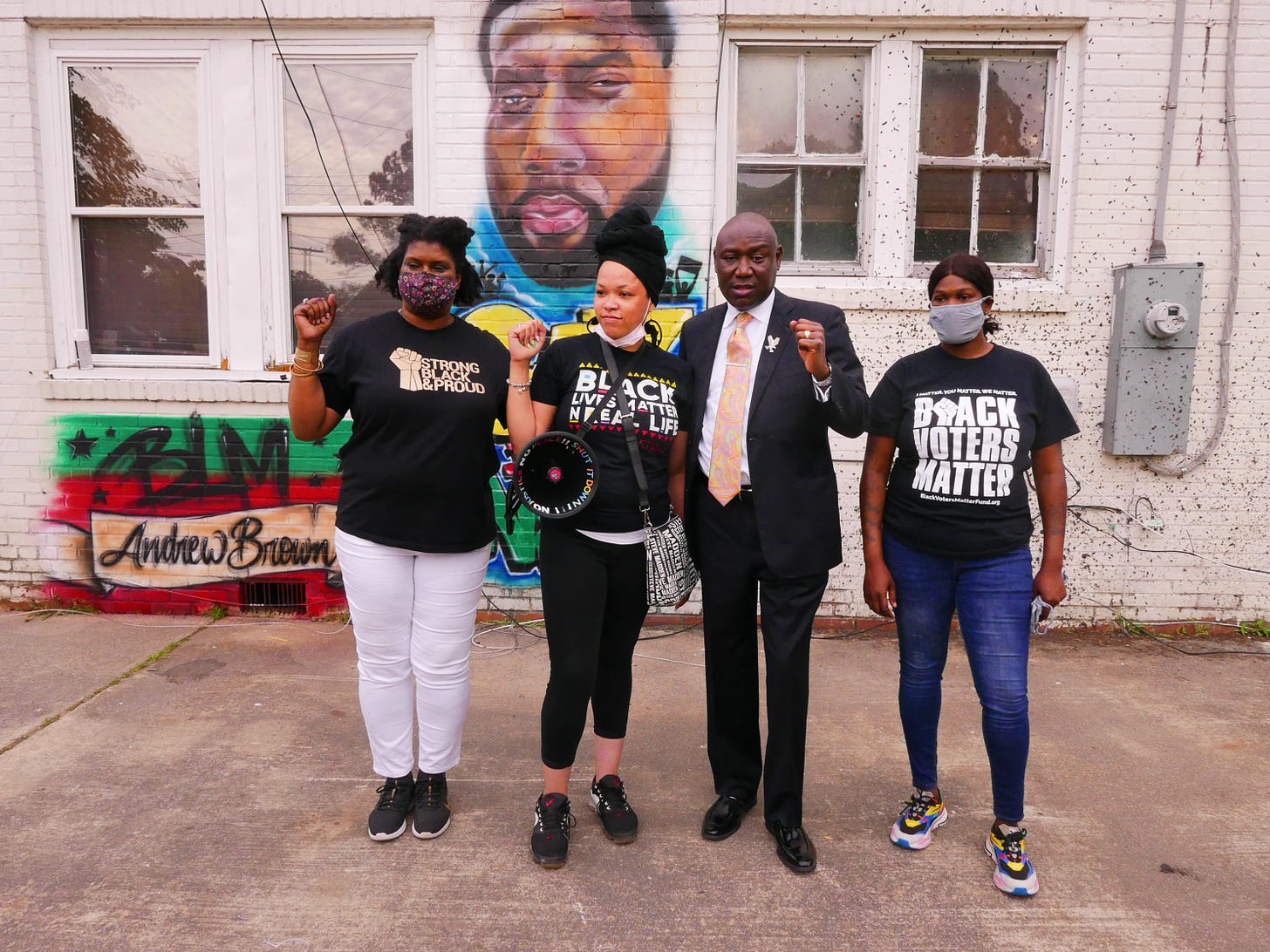Attorney Ben Crump On His Quest To ‘Raise The Value Of Black Life’ In The Courtroom And On Capitol Hill
ELIZABETH CITY, N.C. — When attorney Ben Crump arrived at the scene of the fatal police shooting of Andrew Brown Jr., he greeted the mourners and neighbors of the dead man with a wave.
“I’m just a country lawyer they let in here,” Crump said as he stepped out of a black SUV parked in front of Brown’s home on Sunday evening.
Crump is one of many attorneys representing Brown’s family, but he has become a singular presence on the national stage advocating for Black victims of police violence. Crump sat down with The Uprising on Sunday night, hours after he examined the site where Brown was killed, to talk about his strategies for winning in the legal arena, the court of public opinion, and in Washington.
Crump described the current system as “open season and legalized genocide of colored people” and suggested mounting protests and a new legislative push mean real change might be on the horizon.
“I just think we’re on the cusp of finally trying to prevent them from killing so many of our people unjustifiably,” Crump said.
In the meantime, Crump is dealing with another tragic death of a Black man at the hands of police. He believes the Pasquotank County sheriff’s deputies acted “recklessly” when they opened fire on Brown while serving a felony drug warrant on April 21. Crump and the family’s other attorneys have presented evidence indicating Brown was shot from behind and raised questions about officials’ efforts to block the release of video footage showing the shooting.
The case is a homecoming of sorts for Crump, who grew up a few hours south in Lumberton, North Carolina and speaks with a pronounced and colorful drawl. After attending law school in Florida, Crump established a practice in his hometown that includes a robust civil rights division.
Crump burst into the national consciousness in 2012 when he represented the family of Trayvon Martin, a Black boy who was killed by one of his neighbors. That case helped usher in the Black Lives Matter movement. And with that newfound spotlight on police violence, Crump has continued to represent the families of victims in many of the most high profile cases. While Crump’s omnipresence has led some to dub him “Black America’s attorney general,” he is no prosecutor. Instead, Crump has won a slew of civil judgements for his clients.
“People fail to realize this has only been about — shoot — since the early 80’s that Black people started getting compensation for police brutality and police killing them,” Crump explained. “Before that, you didn’t get no money when the police killed you. … That was accepted in America. So I have tried to sometimes singlehandedly raise the value of Black life.”
His work on civil suits is only part of Crump’s approach to these cases. Crump often cites the famed civil rights attorney and former Supreme Court Justice Thurgood Marshall as a personal hero, noting that Marshall’s work taught him: “If you didn’t bring attention to the matter, the law was not going to be your friend.”
“You fight in two courts,” Crump said. “First of all, you got to fight in the court of public opinion. And if you can win there, if you can win there, then you might just get a chance to get into the court of law.”
For that reason, Crump’s representation of his clients often includes a media blitz. He believes that it’s pivotal for white Americans to want change as well. Because of this, Crump tries to emphasize the personal details of the victims in these cases in order for white people to “see the humanity in our children.”
“I think, oftentimes, people forget that the hashtags and the cases are real life people, that after the cameras go and everybody goes, they’re still trying to mend together the pieces that have been broken,” Crump said. “It’s not going to stop until we can make our white brothers and sisters see that it’s bad for them as much as it’s bad for us.”
Crump believes it’s become far easier to spotlight these cases in recent years since many are now playing out on video due to the prevalence of smartphones and surveillance cameras.
However, the effectiveness of footage can be limited. As proof of this, Crump pointed to the case of Eric Garner, a New York City man who died in 2014 after being filmed begging for air while police officers knelt on his body and choked him. Garner’s death was ruled a homicide and his family received a multimillion dollar settlement, but none of the officers received criminal penalties and it took five years for the officer who held him in a chokehold to be fired.
“Everybody… agreed that Eric Garner won in the court of public opinion, but you know, it's going on six years now and his family has gotten no due process, no day in court,” Crump said, adding: “That's with a video.”
While Crump does his work in courtrooms and on the airwaves, he appreciates the Black Lives Matter activists who take to the streets and stage protests around many of these high profile cases.
“First thing I do is thank the young activists, because, I think, as when Dr. King and them were marching, nothing would have happened without those young activists,” Crump said. “So I’m so grateful to them.”
Crump credits the protest movement with helping him secure the $12 million settlement for the family of Breonna Taylor, a Kentucky woman who was shot in her own home last year during the course of a chaotic drug raid. While Crump has clear admiration for the protesters, the mass arrests that have occurred amid rioting at some demonstrations makes him anxious.
“Do I want them to go to jail? No. But I understand their perspective. Their perspective is, it’s just wrong. And they haven’t lived long enough to appreciate the fact that things go slowly,” Crump said. “I feel it would be disingenuous of me to tell them not to do whatever they felt they needed to do and we have to support these young people.”
“I don’t want them to go to jail though,” he added. “And they seem hell bent on going to jail.”
Crump also credits young activists with helping secure the exceptionally rare guilty verdict rendered earlier this month against Derek Chauvin for the killing of a Black man named George Floyd last year. Chauvin, who was a police officer in Minneapolis, Minnesota, was filmed holding his knee on Floyd’s neck for over nine minutes as Floyd and bystanders pleaded for him to stop. Crump represented Floyd’s family and worked closely with Minnesota Attorney General Keith Ellison during that prosecution.
The Floyd case took Crump to Washington, where he has helped lead a push for police reform legislation that bears Floyd’s name. He believes it is imperative for the George Floyd Justice In Policing Act to pass quickly due to the Democrats’ fragile majorities in Congress.
“I think this is our time now. This is our moment,” Crump said. “If we can’t get it done now, I don’t know when we’re going to get it done. We don’t know what’s going to happen in November 2022. ... If they lose control of the Senate, then it’s done.”
Crump traveled to Capitol Hill last week with family members of victims of police violence, including Floyd’s brother, Philonise. The group met with key lawmakers and had what Crump described as an “emotional” meeting at the White House with top advisers to President Biden.
On the campaign trail last year, Biden vowed to tackle criminal justice reform and establish a national police oversight commission within his first 100 days. That deadline came and went this month. But now, Biden is focusing on the Hill and has called for Congress to send him criminal justice reform legislation to pass by May 25, the anniversary of Floyd’s death. Crump said he’s “respectful” of Biden’s desire to work through Congress.
“I haven’t seen him get as engaged as we might need him to be,” Crump said of Biden. “They said they want to let Congress do their work and, if Congress can give him a bill that the families agree to, then he will sign it. He wouldn’t have a second thought about it. That’s what he’s saying.”
The proposed legislation would, among other things, make it easier for the Justice Department and state officials to investigate alleged police misconduct and bias, expand the use of police body and dashboard cameras, and place new restrictions on the use of force. While Crump doesn’t think this will solve all of the Black community’s issues with the criminal justice system, he believes it would be an important tool for curbing police violence.
“It’s not only that the police are killing us, but then the laws are killing us even more. Whether it’s protecting the police or whether it’s convicting marginalized minorities —especially Black people — of these trumped up felony convictions,” said Crump. “People say, ‘Well, you think that would stop it Attorney Crump? I don't know if it will stop it. I'm not saying that, but it'll make it easier for us to put them in prison.”
For Crump, one of the most important pieces of the legislation is a provision that would limit the application of qualified immunity, a legal doctrine that protects government employees from facing civil suits due to their conduct on the job. Critics argue qualified immunity, which was introduced by the Supreme Court in 1967, shields police officers from facing consequences for alleged brutality.
“Since the creation of qualified immunity, you see every killing, I mean, just outrageous killings, always get covered,” said Crump.
Qualified immunity is a major sticking point in the police reform push. While the legislation was passed by the Democratic House majority this year, it will need some Republican support to get through the Senate. Crump said the negotiations got off to a “good” start, but “there were some backsteps” as staffers got to work. When asked where the opposition to the effort was, Crump offered a simple answer.
“The whole Republican Party,” Crump said with a laugh.
Tim Scott of South Carolina, who is the only Black Republican senator, is leading the negotiations for the GOP. Scott has suggested removing qualified immunity for police departments while preserving protections for individual officers.
For Crump, it’s imperative to address qualified immunity, particularly if the law is going to bear Floyd’s name.
“It’s not meaningful and everybody has said we’ve got to have meaningful legislation because our clients got their blood on this legislation,” said Crump. “If it’s not going to be meaningful, don’t put their names on it.”
Crump, who has taken on over 200 police violence cases, doesn’t charge his clients if he loses. After victories, his firm takes a third of any money awarded.
That’s been a lucrative practice and Crump literally wears some winnings on his sleeve with a penchant for custom monogrammed shirts and a dazzling diamond studded watch. And that wealth has led to some criticism that he is an opportunist and is personally gaining from taking on these cases.
But there’s also a clear cost: Crump noted he has seen “less and less” of his family in recent years due to his travels around the country. His prominent role on controversial cases has also put him in danger.
“You're going to get the death threats, and then, they'll put you in the crosshairs,” Crump said. “But, you know, you got to have something worth dying for man.”
There’s also an emotional burden involved in spending so much of his time dealing with dead Black people and counseling their grieving families.
“I’m very tired of it,” Crump said. “I pray that we can pass this legislation so we can hopefully close down my police brutality division in my law firm, because I am so tired of seeing black people killed.”
In Elizabeth City, many residents were pleased to see Crump take on Brown’s case. As Crump visited the scene of the shooting on Sunday, supporters continually ran up to him to pose for selfies. Crump was happy to oblige and posed with his fist in the air.
On Monday evening, hours after Brown’s funeral, Ernest Banks was standing in downtown Elizabeth City in front of his shoe repair shop. He teamed up with a local t-shirt maker, Darrius Turner, to make a memorial in the storefront. They hung shirts bearing Brown’s name and a “Black Lives Matter” flag in the window between a pair of lamps that Banks said have remained lit every night since Brown’s death. Banks said Crump has “the support of the community behind him” and he’s convinced the attorney will be victorious in this case.
“He’s doing a hellified job. He’ll get the job done with the local lawyers they’ve got here,” Banks said of Crump, adding, “He’s one of the hardest hitting men I’ve seen. … I feel like he’s going to get the justice.”
But when it comes to his larger quest for reform, Crump has his doubts. He offered a decidedly pessimistic response when asked if he believes the country will truly change in his lifetime.
“I can’t say. I pray every day it will,” Crump said. “I want to believe in America so much but, America keeps breaking our heart.”
—
The Uprising is a new, unconventional, and fully independent morning politics newsletter. This week has featured special reports on Brown’s killing. On Friday, I will publish a special issue including my full conversation with Crump that will be exclusively available to paid subscribers. Sign up now if you don’t want to miss it!







The police have shot and killed more white people in the last 5 years than poc. Mr. Crump is a race baiter. I think this situation is about police reform - not a genocide on people of color. If Ben Crump cares about people of color dying by gunfire, he should head up to Chicago and try and do something about al of the black people who are being killed by gun violence every single day.